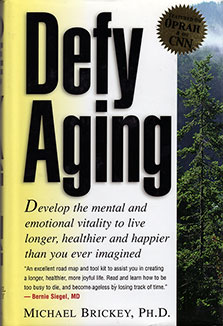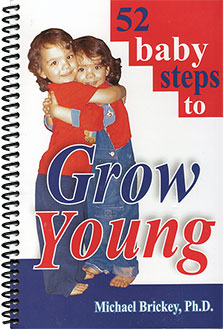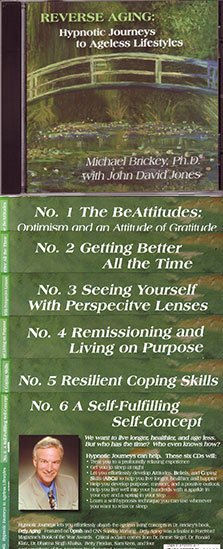The Defy Aging Newsletter
Anti-aging psychology, holistic health, and wellness
These are archives of a biweekly e-mail newsletter for helping you think, feel, look, and be more youthful and live with purpose.
August 23, 2007 Number 171
This issue:
Exercising Moderation
Action to take
Consider how your fitness activities affect your long-term health.
Why
A just released study from Duke University received a lot of media coverage by reporting that moderate exercise tends to be healthier than aggressive fitness programs. Well duh. Marathons are very hard on a person’s body. It’s no accident that Lance Armstrong developed prostrate cancer—a million miles of sitting on a bicycle seat doesn’t do your prostate and any favors. Professional basketball wears out knee joints. It’s rare to find competitive football players who have not sustained very serious injuries. Soccer would seem benign but head butting a ball going 30 miles an hour isn’t good for your brain.
But the Duke study found more benefits than just avoiding wearing out body parts and avoiding injuries. The study followed 240 sedentary middle-aged adults for eight months. The low quantity/moderate intensity group developed lower triglyceride (fat in the bloodstream) levels than the high quantity/high intensity group, lower triglyceride levels than the low quantity/high intensity group, and of course lower triglyceride levels than the sedentary (control) group.
The researchers found that none of the groups had improvement in LDL ("bad cholesterol"). Increased frequency and intensity of exercise did improve HDL ("good cholesterol") levels. Even after participants discontinued exercising for two weeks, triglyceride levels stayed lower. Needless to say the control group gained weight and waist size.
Physical fitness is essential to good physical and mental health. Anything taken to an extreme, however, often becomes problematic. Knee joint replacement surgery is no picnic. Neither are arthritis or repetitive stress injuries.
Should you give up competitive sports for activities that are kinder to your body? If a sport gives you great joy, it probably is worth doing. If you are doing the sport or exercise just to stay fit, consider whether there are healthier alternatives that have less risk of damaging or wearing out body parts.
The ideal fitness program, sport, or lifestyle should accomplish the following:
- provide a cardiovascular workout
- build strength by challenging muscles (benefits include increasing metabolism and bone density)
- foster flexibility. balance, and good posture
- exercise your whole body
- do not harm—or at least have a low risk of harm
Bonus points go for helping with breathing and relaxation.
Often a single sport or activity won’t meet all of the criteria. That’s no problem. Variety makes for a better program anyway.
Quotes
What's the human body been doing the last 3,000 years? It wasn't doing hard-core endurance athletics, It's been walking with short bursts of speed, quick bursts to capture prey, then walk back home.
~Kevin Coggins
All things in moderation
~Aristotle’s doctrine of the golden mean
Humor
I love boxing. Where else do two grown men prance around in satin underwear fighting over a belt? The one who wins gets a purse. They do it in gloves. It’s the accessory connection I love.
~John McGivern
Reprint this article from:
THE DEFY AGING NEWSLETTER
Anti-Aging Psychology
Holistic Health and Wellness
This newsletter article may be reprinted in E-zines, newsletters, newspapers, and magazines provided the content is not edited and the attribution below is given. Formatting may be changed and you may use one of the web site pictures of the author to accompany the article.
"Dr. Michael Brickey, The Anti-Aging Psychologist, teaches people to think, feel, look and be more youthful. He is an inspiring keynote speaker and Oprah-featured author. His works include: Defy Aging, 52 baby steps to Grow Young, and Reverse Aging (anti-aging hypnosis CDs). Visit www.NotAging.com for a free report on anti-aging secrets and a free newsletter with practical anti-aging tips."






